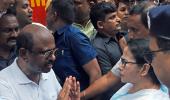The Calcutta high court on Friday directed that West Bengal Chief Minister Mamata Banerjee is free to make any statement concerning Governor C V Ananda Bose, not crossing the contours of freedom of speech and expression and public duty.

Banerjee and Trinamool Congress leader Kunal Ghosh had moved an appeal before a division bench, challenging an interim order by a single bench directing the chief minister and three others not to make any defamatory or incorrect statement against Bose by way of publication and on social platforms till August 14.
Modifying the single bench order, the division bench presided by Justice I P Mukerji directed that Banerjee and Ghosh will be free to make any statement concerning the Governor, not crossing the contours of freedom of speech and expression and public duty.
"Otherwise, the appellants run the risk of being exposed to a claim for heavy damages and other retaliatory actions," the bench, also comprising Justice Biswaroop Chowdhury, said in its order, disposing of the appeals.
It directed that the single bench will consider the interim application and determine it after filing of affidavits by the parties in the defamation suit.
The matter will come up for hearing again before the single bench on August 14.
The court noted that the lawyers for the respondents in the defamation suit have "very correctly stated" that the statements referred to in the body of the judgement of the single judge "have not even prima facie been declared to be defamatory of his excellency or incorrect”.
"In the absence of such declaration, what is the defamatory statement referred to in the impugned order which is being restrained from being published in future is not known. This order applies to statements being made by the appellants in future," the division bench said.
Passing the order, it observed that a man's reputation is sacrosanct to him and that the law gives him the right to protect it.
"An important part of this reputation is his moral character," the court observed, noting that the freedom of speech and expression is conferred on every citizen of India as a fundamental right.
Holding that this right “cannot be throttled or gagged”, the bench said this freedom of expression is subject to reasonable restrictions.
The court said one of the restrictions applicable in this case is the restriction that applies to words, spoken or written, that tend to defame others.
The bench observed that public has the right to know the truth and if the truth is in the public interest, a member of the public has every right to expose it.
"If this right is vested in every citizen, such right is vested with more responsibility in the chief minister," it said.
The bench also said that expression of this freedom is, however, subject to certain conditions under the law of defamation.
"The first is that it should stand the test of justification or truth or must be a fair comment or the maker of the statement must owe a duty to the persons to whom the defamatory statement was published, which is described as qualified privilege.
"If the maker fails the test he is liable to pay damages in the civil action and may be charged with commission of an offence," the bench observed.
Dhiraj Trivedi, the advocate appearing for the governor, submitted that his client's reputation had been tarnished.
Bose had filed the defamation suit against Banerjee, two newly-elected TMC MLAs Sayantika Banerjee and Reyat Hossain Sarkar and party leader Kunal Ghosh.
Speaking on an imbroglio over oath-taking of the two new MLAs, Banerjee had made certain comments, over which the governor moved the defamation suit before the high court.
He had also prayed for an interim order restraining them from making any further comment in connection with the matter.












 © 2025
© 2025